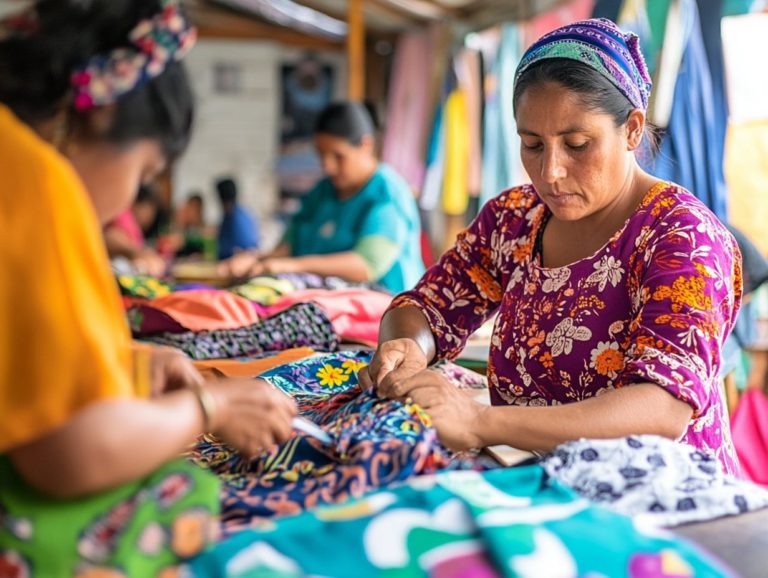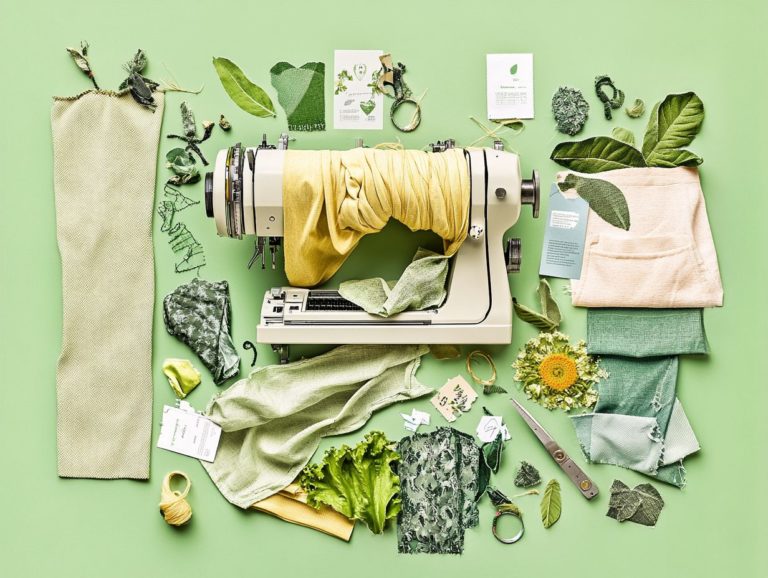Understanding Eco-Friendly Fabrics: A Quick Guide
In today s world, choosing eco-friendly fabrics is more crucial than ever. As you become increasingly aware of your environmental footprint, you ll notice that the shift towards sustainable materials in fashion is gaining remarkable momentum.
Get ready to discover the exciting reasons for selecting eco-friendly options! This article showcases popular choices like organic cotton, bamboo, and hemp while highlighting the numerous benefits these fabrics provide, from reducing environmental impact to enhancing personal health.
You will also find valuable tips on how to effortlessly integrate these sustainable fabrics into your wardrobe.
Explore how even small changes can lead to significant positive impacts!
Contents
Key Takeaways:
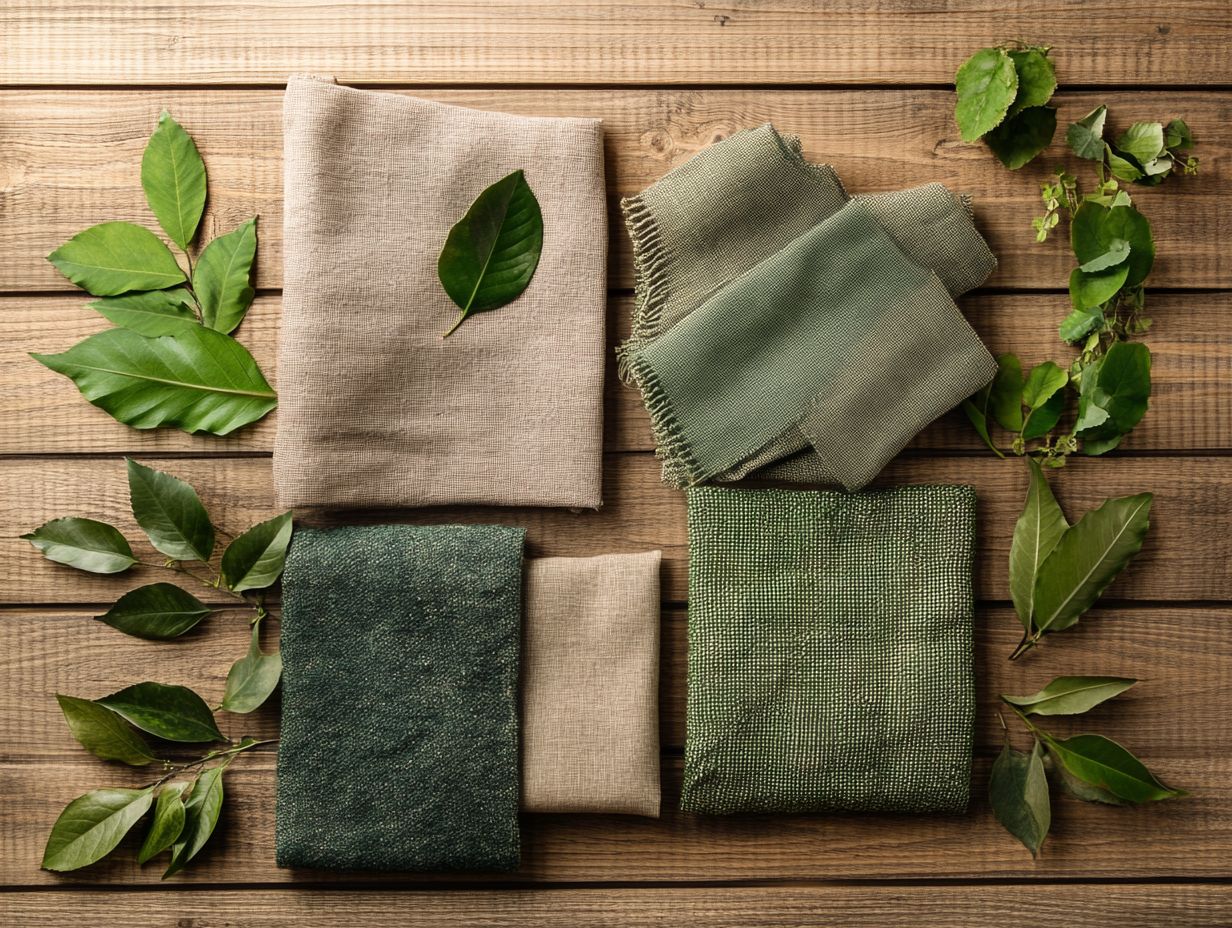
- Choosing eco-friendly fabrics helps reduce environmental impact and promotes sustainable practices.
- Common types of eco-friendly fabrics include organic cotton, bamboo, hemp, Tencel, and recycled polyester.
- Incorporating eco-friendly fabrics into your wardrobe benefits the environment, your health, and supports ethical fashion choices.
The Importance of Eco-Friendly Fabrics
The significance of eco-friendly fabrics in the fashion industry is paramount, particularly as you, the discerning consumer, become more attuned to the environmental repercussions of fast fashion and the substantial carbon emissions linked to conventional textile production.
Embracing sustainable fashion practices those that highlight materials such as organic cotton, bamboo, and recycled fibers is essential in confronting these urgent challenges.
By opting for biodegradable fabrics fabrics that break down naturally and do not harm the environment and championing sustainable brands, you have the power to instigate meaningful change in the industry while fostering a commitment to ethical fashion.
Why Choose Sustainable Materials?
Choosing sustainable materials is crucial for you to help reduce the fashion industry’s environmental impact while supporting eco-conscious practices. By opting for materials like organic cotton, you can make a powerful difference in decreasing water pollution and cutting down on the chemical usage associated with traditional cotton farming.
This thoughtful choice not only conserves precious water resources but also safeguards vital ecosystems from the dangers of harmful pesticides and synthetic fertilizers. As awareness grows, you may notice a shift in buying habits, with more consumers, like yourself, actively seeking transparency in clothing production.
The increasing demand for sustainably sourced materials reflects a collective desire for a greener future, pushing brands to adopt responsible practices that benefit both the planet and discerning customers like you.
Common Types of Eco-Friendly Fabrics
Understanding the various types of eco-friendly fabrics is essential for making informed choices in sustainable fashion. You have options like organic cotton, bamboo fabric, hemp fabric, Tencel fabric, jute fabric, and recycled polyester, each presenting its own unique benefits and environmental advantages.
By exploring these materials, you enable yourself to make choices that are not only stylish but also kind to the planet.
Organic Cotton
Organic cotton is an exquisite, eco-friendly fabric cultivated without synthetic pesticides or fertilizers, positioning it as a sustainable alternative to conventional cotton farming.
This natural method minimizes the detrimental environmental impact typically associated with traditional cotton production and ensures that the fabric is exceptionally soft and gentle against the skin. You may increasingly find that garments crafted from organic cotton are free from harmful chemicals, contributing to your overall health and reducing the likelihood of skin irritations and allergies.
As sustainable fashion continues to gain traction, more eco-conscious consumers are deliberately seeking out organic cotton options, aligning their purchasing choices with their values of sustainability and environmental stewardship. This movement signals a robust demand for responsibly sourced materials, paving the way for a more sustainable future within the fashion industry.
Start your journey towards a sustainable wardrobe today!
Bamboo
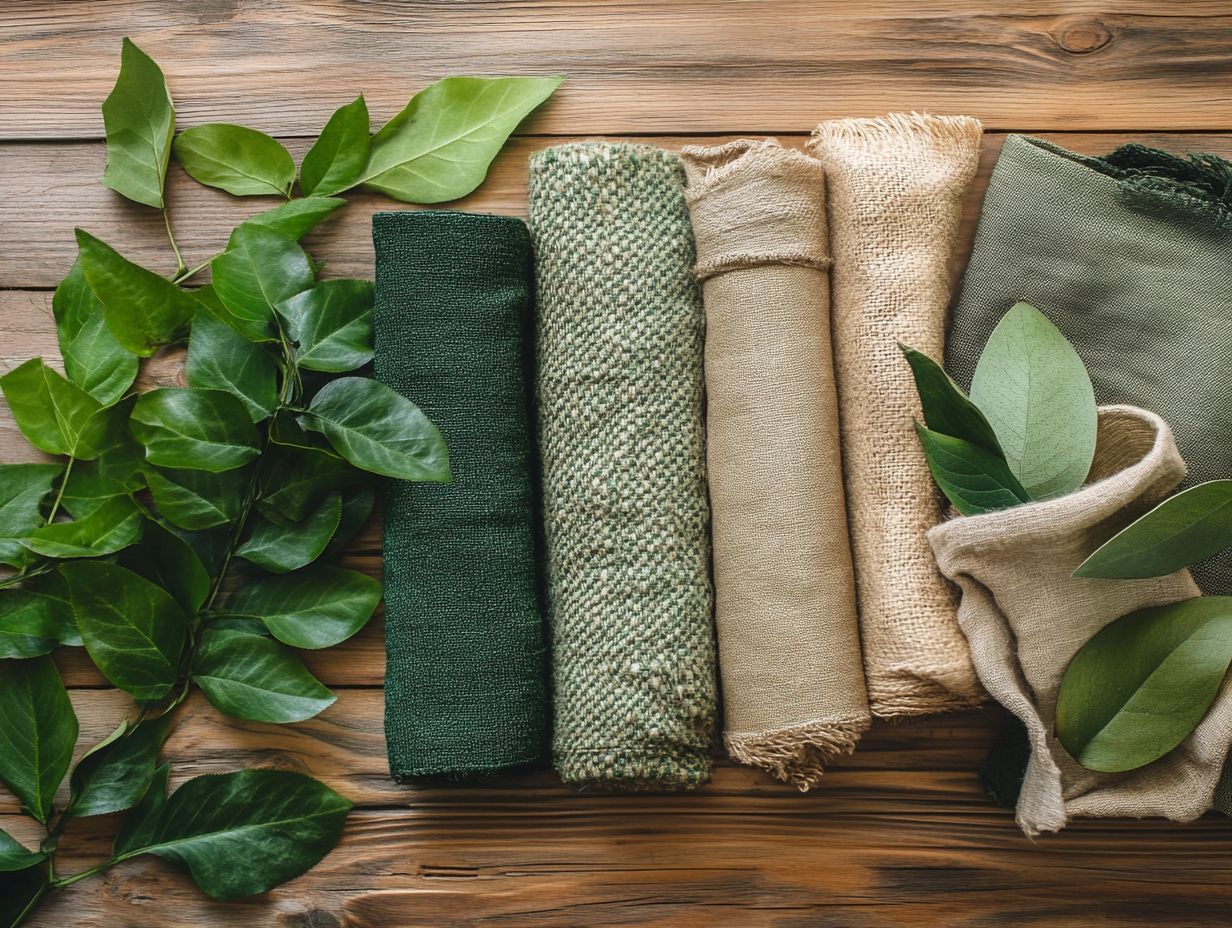
Bamboo fabric, sourced from the rapidly growing bamboo plant, is renowned for its incredible softness and breathability. It also has natural antibacterial properties, making it a game changer for the environment!
Bamboo offers more than just comfort. Its cultivation brings substantial environmental advantages. This remarkable plant thrives with minimal water and adapts effortlessly to various climates without the need for chemical fertilizers.
Such qualities aid in water conservation and nurture healthier ecosystems. Bamboo’s natural pest resistance reduces the need for harmful pesticides, paving the way for a more organic approach to agriculture.
As you seek eco-friendly materials, bamboo has solidified its status as a preferred option for those who value sustainability. It seamlessly merges style with environmental responsibility.
Hemp
Hemp fabric stands out as one of the most eco-friendly materials, celebrated for its remarkable durability and biodegradability. It has a minimal environmental impact during cultivation.
Hemp requires minimal pesticide use, making it an ideal choice for sustainable agricultural practices. This resilient plant flourishes effortlessly across various climates, adapting to both temperate and subtropical regions.
This adaptability contributes to its low cultivation footprint and guarantees a steady supply of raw materials for numerous industries. In the fashion world, hemp is making waves as it is woven into chic garments that exemplify sustainable principles.
Designers love its natural textures and inherent strength. Hemp perfectly aligns with eco-conscious lifestyles.
Tencel
Tencel, crafted from sustainably sourced wood pulp, offers a luxurious feel and remarkable breathability. It also boasts impressive moisture absorption, making it a premium choice in sustainable fashion.
This innovative fabric is born from a meticulous manufacturing process that utilizes a closed-loop system, recycling water and solvents and significantly reducing its environmental impact. By minimizing waste, Tencel is an eco-friendly hero you won t want to miss!
Not only does it provide aesthetic versatility think flowing dresses and comfortable activewear but its natural properties also ensure comfort without sacrificing style.
As more brands embrace ethical practices, your demand for textiles like Tencel continues to grow, positioning it as a frontrunner in the journey toward greener fashion.
Recycled Polyester
Recycled polyester is an innovative, eco-friendly fabric crafted from post-consumer plastic waste. It presents a sustainable alternative to virgin polyester in the fashion industry.
By transforming plastics that would otherwise contribute to environmental pollution, you help reduce the volume of trash clogging landfills and oceans. Opting for recycled polyester not only lessens your demand for new raw materials but also lowers energy consumption during production.
Brands like Patagonia and Adidas have made strides in integrating this fabric into their collections, showcasing their commitment to sustainability. Their actions inspire other companies to follow suit, demonstrating that the fashion industry can pivot toward a greener future while delivering stylish products.
Benefits of Using Eco-Friendly Fabrics
The advantages of choosing eco-friendly fabrics go beyond just looking good. They also carry a profound environmental impact and promote health benefits for consumers.
These fabrics reflect a dedication to ethical fashion practices that resonate deeply with eco-conscious shoppers.
Explore eco-friendly fashion options today and be part of the sustainable movement!
Environmental Impact
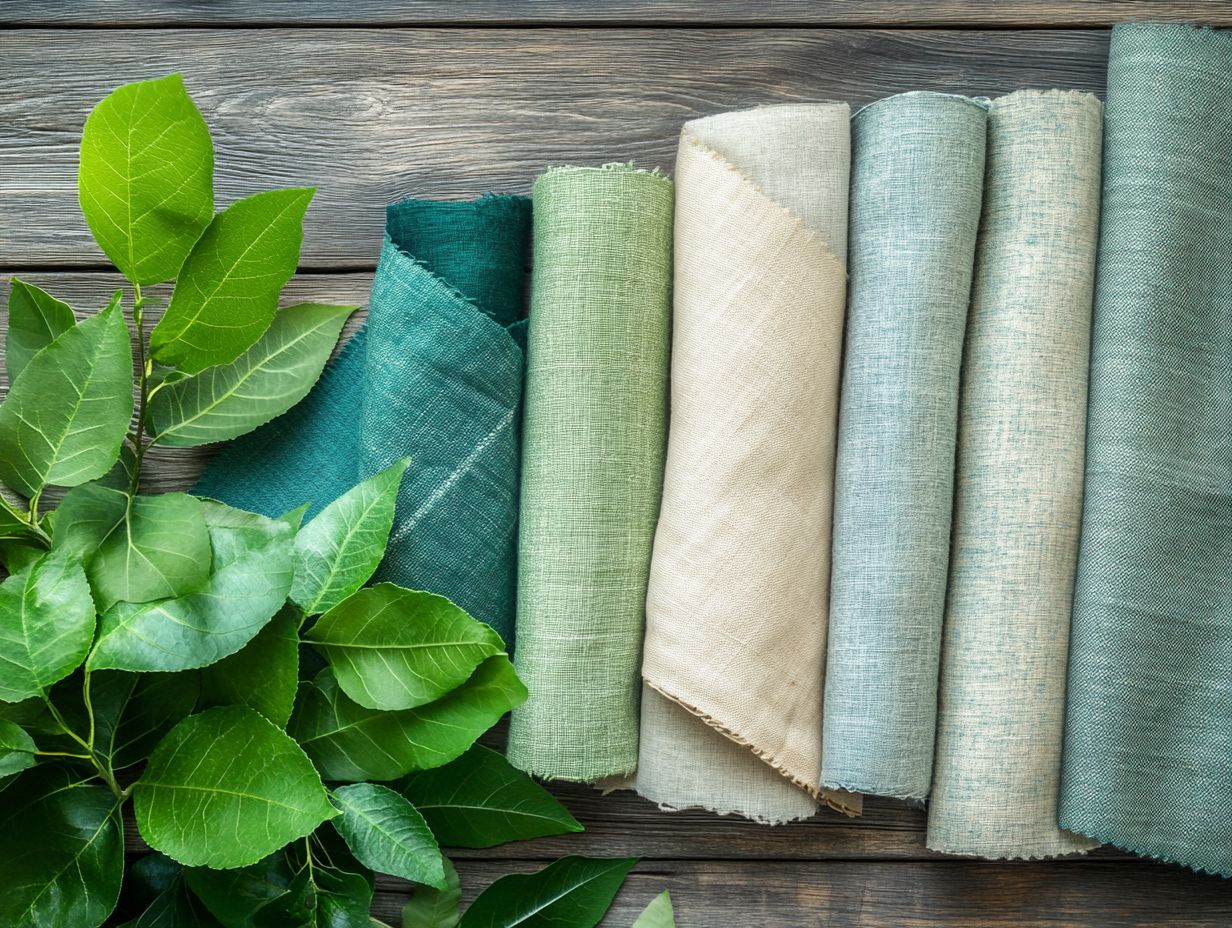
The environmental impact of eco-friendly fabrics is remarkable. They typically require significantly less water, emit fewer greenhouse gases, and play a key role in reducing water pollution compared to traditional textiles.
Take organic cotton, for example; it uses up to 90% less water than its conventional counterpart. This statistic highlights the need for resource conservation in the textile industry.
According to a study from the Higg Materials Sustainability Index, a tool that measures the environmental impact of materials, producing just one kilogram of recycled polyester can cut carbon emissions by up to 75% when contrasted with virgin polyester.
These eco-friendly options not only reduce water pollution by minimizing the toxic chemicals used during production, but they also help safeguard aquatic ecosystems. Given that the fashion industry is a significant contributor to environmental degradation, choosing these alternatives is a powerful step toward a sustainable future!
Health Benefits
Eco-friendly fabrics, particularly organic cotton, present a wealth of health benefits that can significantly enhance your well-being, including reduced skin irritation and allergies. For those who prioritize their health, these materials emerge as the preferred choice.
Sustainable fabrics are typically produced without harmful chemicals or toxins, cultivating a healthier lifestyle for both you and the planet.
By minimizing exposure to these irritants, eco-friendly fabrics can yield long-term advantages, such as improved skin health and overall wellness.
Opting for sustainable fashion is not just a personal choice; it actively contributes to environmental well-being by reducing the carbon footprint linked to textile production. As awareness of the benefits of such fabrics expands, the movement toward sustainable fashion continues to gain momentum, encouraging a collective shift toward a healthier future that prioritizes both individual and planetary health.
Tips for Incorporating Eco-Friendly Fabrics into Your Wardrobe
Incorporating eco-friendly fabrics into your wardrobe calls for a discerning approach to both shopping and caring for garments crafted from sustainable materials. This thoughtful consideration ensures that your fashion choices resonate with your values and reflect your commitment to a more conscious lifestyle.
Shopping and Care Tips
When you re on the hunt for eco-friendly fabrics, look for certifications and labels that highlight sustainable practices. Giving your sustainable fashion pieces the right care can significantly extend their lifespan.
Look for certifications like the Global Organic Textile Standard (GOTS), OEKO-TEX Standard 100, and the Premium Certified Organic label. These are key indicators of environmentally friendly production processes. Such labels assure you that the materials are crafted from organic fibers, free from harmful chemicals, showcasing a genuine commitment to eco-consciousness.
To preserve the integrity of these fabrics, it s crucial to follow the care instructions. This often means washing in cold water, steering clear of harsh detergents, and opting for air drying whenever possible. By making informed choices and caring for sustainable fabrics properly, you can help foster a more sustainable future while enjoying your stylish pieces.
Frequently Asked Questions
What are eco-friendly fabrics?
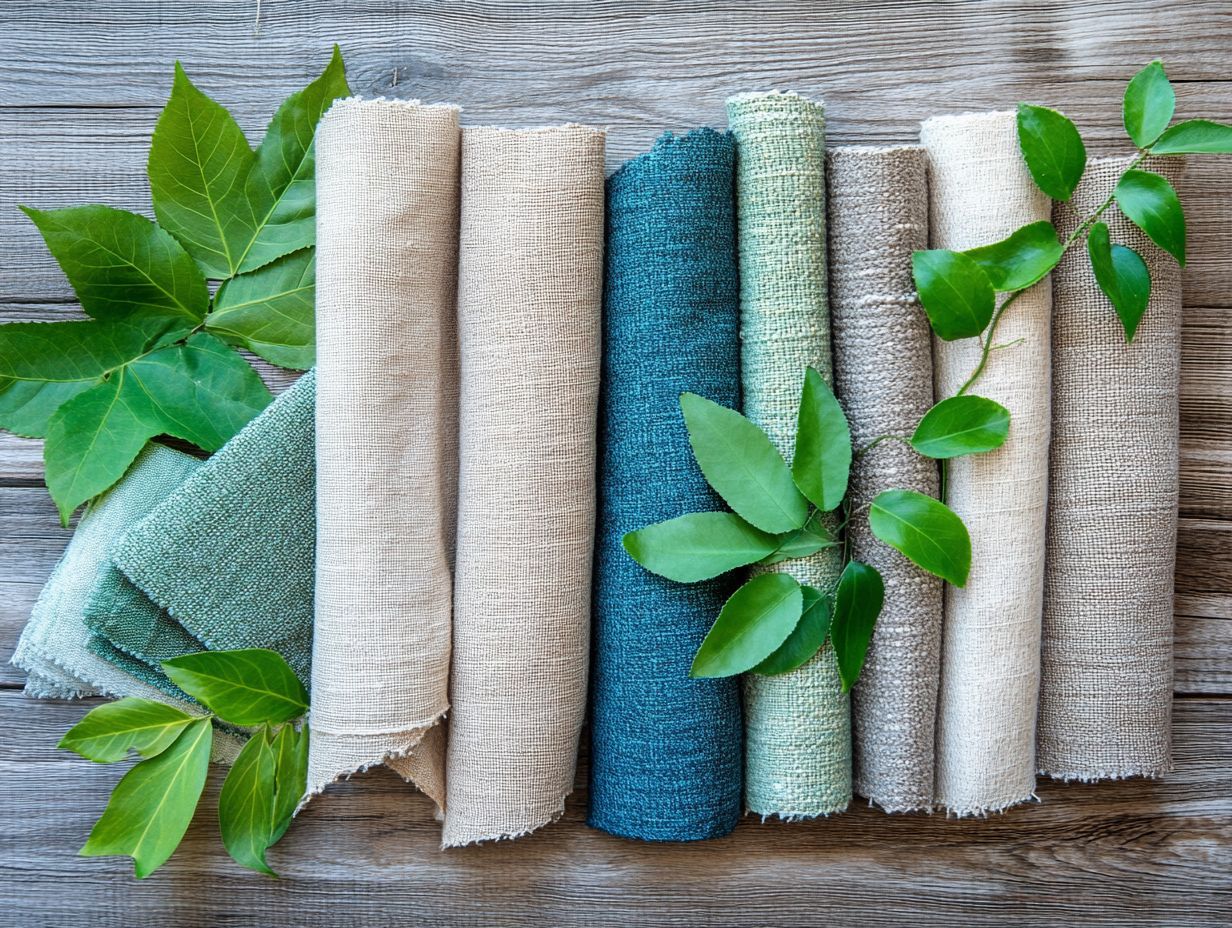
Eco-friendly fabrics are made using methods that are kind to the environment. They come from natural and renewable resources, minimizing harm to our planet.
Why is it important to use eco-friendly fabrics?
Using eco-friendly fabrics helps reduce our carbon footprint and lessen the negative impact on the environment. These fabrics are also better for our health as they are free from harmful chemicals and toxins.
What are some examples of eco-friendly fabrics and ethical fashion?
Eco-friendly fabrics include organic cotton, bamboo, hemp, and Tencel. These materials come from natural resources and can break down naturally.
How can I identify eco-friendly fabrics?
Check for labels like GOTS, which stands for the Global Organic Textile Standard, and OEKO-TEX Standard 100. These certifications ensure the fabric is friendly to the environment.
Are eco-friendly fabrics more expensive?
Some eco-friendly fabrics may cost more upfront. However, they are often more durable and last longer, making them a smart choice over time.
Their production methods also support fair wages and ethical working conditions, making your purchase even more meaningful!
Can I recycle eco-friendly fabrics?
Yes! Many eco-friendly fabrics can be recycled or composted at the end of their life. This practice helps minimize waste and fosters a more sustainable fashion industry.




